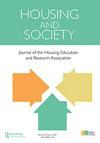Weak housing demand in a shrinking city: the potential effects of the water crisis on Flint, Michigan’s housing market and homeowners’ perceived mobility
Q2 Social Sciences
引用次数: 4
Abstract
ABSTRACT This study explores perceived and real effects of a human-made environmental crisis (the Flint water crisis) on residential mobility and housing demand in the weak market city of Flint, Michigan, USA. We surveyed Flint residents in summer 2016 and found that a large proportion of homeowners believed the water crisis negatively affected their property values; more than half wanted to leave the city but felt constrained by the inability to sell their homes; and one-fifth considered abandoning their homes to leave the city. We used regression models to examine predictors of these responses, and spatial statistics to examine whether responses clustered in the city. Then, to see if the perceptions of homeowners reflected actual changes in the housing market caused by the crisis, we used descriptive statistics, maps, and repeated measures ANOVA models to examine changes in home sales prices and mortgages originations in Flint from 2012–2017, before and after the start of the crisis. The results indicate the water crisis had no discernable effect on the city’s housing market, likely because the market was incredibly weak prior to the crisis. The severe lack of housing demand irrespective of the crisis potentially contributed to residents’ perceptions of constrained mobility.萎缩城市的住房需求疲软:水危机对密歇根州弗林特住房市场和房主流动性的潜在影响
摘要本研究探讨了人为环境危机(弗林特水危机)对美国密歇根州市场疲软城市弗林特的住宅流动性和住房需求的感知和实际影响。我们在2016年夏天对弗林特居民进行了调查,发现很大一部分房主认为水危机对他们的房地产价值产生了负面影响;超过一半的人想离开这座城市,但由于无法出售房屋而感到拮据;五分之一的人考虑放弃家园离开城市。我们使用回归模型来检验这些反应的预测因素,并使用空间统计来检验反应是否聚集在城市中。然后,为了了解房主的看法是否反映了危机导致的住房市场的实际变化,我们使用描述性统计数据、地图和重复测量方差分析模型来研究2012-2017年危机开始前后弗林特的房屋销售价格和抵押贷款发放的变化。结果表明,水危机对该市的住房市场没有明显影响,可能是因为危机前市场非常疲软。无论危机如何,住房需求的严重缺乏都可能导致居民对流动性受限的看法。
本文章由计算机程序翻译,如有差异,请以英文原文为准。
求助全文
约1分钟内获得全文
求助全文
来源期刊

Housing and Society
Social Sciences-Urban Studies
CiteScore
2.30
自引率
0.00%
发文量
10
期刊介绍:
Housing and Society is the journal of the Housing Education and Research Association (HERA). The journal supports the mission of HERA by providing for the dissemination of research and other scholarly work. Submissions from a broad range of perspectives are encouraged. Topics in housing include: policy, design, social aspects, gerontology, behavioral aspects, energy/environment, equipment, interiors, economics, theory/model development, education, and program development or evaluation. The journal welcomes the submission of original research articles, notes and commentaries. Notes are shorter manuscripts presenting succinct information on housing related to one of the following categories: - Research: exploratory or not heavily theory-based or statistically analyzed - Academic: innovative teaching ideas - Program: development, implementation, and/or evaluation of Cooperative Extension or other housing programming efforts - Policy: examination of policy impact, comparative analysis, and/or need to achieve housing goals - Reviews: books, documentaries, etc.
 求助内容:
求助内容: 应助结果提醒方式:
应助结果提醒方式:


